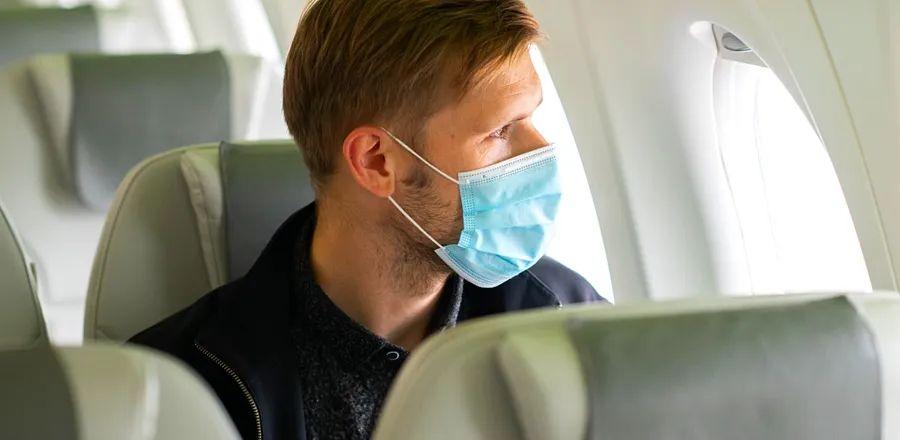COVID Cases Are Rising Again. Is Travel Still Possible If I Test Positive?

It's astonishing to think that four years ago, summer travel came to a standstill. Since the COVID-19 vaccine became widely accessible and travel restrictions eased, demand for travel has surged; in fact, the World Economic Forum predicts international tourist numbers will match pre-pandemic levels this year. Air travel is nearing its pre-pandemic figures, as reported by IATA (International Air Transport Association).
Although travel has resumed, the COVID-19 virus remains prevalent. The CDC estimates that over 95 percent of the U.S. population has encountered the virus since the pandemic began—either through infection, vaccination, or both. This increased immunity doesn't guarantee that traveling while testing positive for COVID-19 is safe or advisable.
Dinogo consulted with infectious disease experts William Schaffner from Vanderbilt University and Thomas Russo, professor and chief of the infectious diseases division at the University of Buffalo, regarding the guidelines for traveling with COVID-19. Dr. Russo links this summer's rise in cases to a combination of increased social activities and travel alongside waning immunity (from past infections or vaccinations). The immune-evasive nature of the FLiRT variants also plays a role.
Should I get a new booster shot for COVID-19?
To prevent hospitalization and severe illness, it's crucial for everyone to stay updated on the latest COVID-19 vaccine. The CDC indicates that receiving the most recent vaccine when eligible enhances your defense against the virus. This guidance applies equally to both high-risk groups and young, healthy individuals. Dr. Schaffner emphasizes that the CDC advises everyone to get the updated vaccine, regardless of their travel plans. An updated version will be available in the fall, so even if you've been vaccinated recently, plan to visit your local pharmacy or schedule an appointment with your doctor once it's released. According to Dr. Russo, this new vaccine will better protect against the circulating variants.
When is the right time to test for COVID-19, and what method should I use?
COVID-19 antigen tests available at pharmacies are still a reliable means to check for infection. While some individuals with mild symptoms, such as slight muscle aches or a cough, may hesitate due to the test cost (averaging around $9.99), Dr. Schaffner stresses that high-risk individuals should definitely get tested. Even though travelers no longer require a negative test to return to the U.S. or visit certain areas that previously had restrictions, it's important not to ignore any symptoms you might have.
Dr. Schaffner asserts that the tests are accessible and effective, emphasizing the importance of testing around four days post-exposure or symptom onset for optimal results. If you have symptoms but receive a negative test result, it's advisable to retest the next day to confirm. “A single negative result doesn’t rule out COVID,” warns Dr. Russo, who suggests conducting at least two or three home tests over a few days and checking that they aren’t expired.
If I test positive and have travel plans, should I still board a plane?
If you’ve tested positive for COVID-19, Dr. Russo refers to the current CDC guidelines on isolation: "You can end isolation if you've been fever-free for a day without medication and are feeling better, but it's important to wear a high-quality, well-fitting mask when around others." He stresses that a mask can reduce the chance of spreading the virus, although it isn't foolproof.
Flying with COVID-19 means you could potentially infect those seated near you, as Dr. Schaffner points out, stating, "You’re likely to infect people in your row and possibly two rows ahead and behind you." He emphasizes that public health advice is against flying if you have a positive test result.
Dr. Russo recommends exercising caution to avoid endangering both yourself and others. He suggests taking Paxlovid, an antiviral pill that helps limit the virus's replication, as it can reduce how contagious you are and shorten the period of infectiousness. However, he clarifies that it's not a complete solution.
Should I inform my travel companions that I have COVID-19?
Dr. Schaffner succinctly states: "If you test positive for COVID, even with mild symptoms, you pose a risk to others on a plane or train, regardless of whether you’re wearing a mask."
"You risk becoming a notorious spreader," he warns. Therefore, if you contract COVID-19 while traveling with friends or family, you should inform them right away and adjust your travel plans accordingly. If you’re already on your trip, this might mean postponing your flight home until you test negative and have isolated, following the latest CDC guidelines. "You could enjoy some fresh air at a park in Rome," but it's best to steer clear of restaurants and have your meals in your hotel room, according to Dr. Schaffner.
If your itinerary includes group meals or events where masks can’t be worn, "that could be a concern," Dr. Russo notes, highlighting that weddings and cruise ships are particularly conducive to rapid COVID-19 transmission.
If possible, secure a Paxlovid prescription before embarking on a long trip, as it will be helpful if you develop COVID-19 symptoms (especially for international travel, according to Dr. Russo). Additionally, consider getting travel insurance in case you need to postpone or extend your trip.
Are there still countries enforcing COVID-19 restrictions?
Currently, most COVID-19 travel restrictions have been lifted. However, it’s wise to review the U.S. Department of State’s list of countries and related travel advisories, which detail visa and health-entry requirements for American travelers.

1

2

3

4

5
Evaluation :
5/5